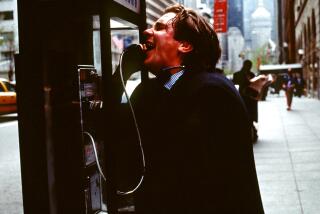Clothier Makes Educated Guess? With Offering
- Share via
Guess? Inc., the Los Angeles manufacturer of trendy casual clothing, revealed Friday its intention to cash in on another hot trend: selling new stock to the public.
The jeans designer plans an initial public offering of 20% of the company stock in the hope of raising about $188 million, most of which will go to the three brothers who own the company and will retain the remaining 80% after the sale.
Several other companies armed with popular brand names have jumped on the IPO bandwagon recently, including Revlon and Estee Lauder. New York-based Designer Holdings Ltd., which markets Calvin Klein jeans, brought 12 million shares to market at $18 each, which jumped to $26 a share when the stock opened May 10 and closed Friday at $31.625.
Guess?--whose products sell under such names as Guess U.S.A., Guess? and Triangle Design, and which also operates retail stores and licenses its name on products ranging from baby clothes to watches--on Friday filed a registration statement with the Securities and Exchange Commission detailing its plans to issue 9.2 million common shares to the public, plus an additional 1.38 million shares to cover any additional demand.
Guess? estimated that the shares will be sold for between $21 and $23 apiece, and the company said it will apply for listing on the New York Stock Exchange.
Proceeds will be used to “repay debt,” the company said. Nearly all of that debt will be held by Guess? owners Maurice, Paul and Armand Marciano, who founded Guess along with their brother Georges in 1981.
This is how it works: To sell stock to the public, Guess? must change its status under the federal tax code from an S corporation to a C corporation. As part of that conversion, Guess? will distribute prior income to its owners.
The Marcianos will receive two airplanes valued at $10 million and promissory notes worth between $170 million and $180 million. Guess? will use the proceeds from the IPO to pay off the promissory notes and any funds remaining will reduce borrowings under an existing credit line. Guess? will lease back one of the airplanes.
Maurice Marciano, company chairman and chief executive, owns 44.8% of the company’s common stock, according to the SEC filing. President Paul Marciano owns 35.5%, and Senior Executive Vice President Armand Marciano owns 19.7%. Georges Marciano left the company in 1993 over a reported strategy disagreement, and the company bought his stock for $203.5 million.
Guess? has never endured a money-losing year in its history, but it has endured long, bruising legal battles.
The Marcianos spent 6 1/2 years and $80 million in legal fees fighting for ownership of Guess?. In 1990, the Marcianos won back full control of Guess? from their archenemies, the Nakash brothers, who founded rival jeans maker Jordache.
The four founding Marcianos had sold a half-interest in Guess? to the three Nakash brothers (Joe, Avi and Ralph) in 1983. The Marcianos were seeking capital and business expertise from the Nakashes.
But the partnership soon foundered and then degenerated into a legal battle. But, as a jury deliberated, the two sides settled.
More recent troubles surfaced in July when garment workers picketed a fancy Guess? store in Beverly Hills and company headquarters on Alameda Street, complaining that they were mistreated by a contract sewing shop called Good Time/Song of California after Guess? lowered the price per garment it was paying the firm.
For 1995, Guess? posted net earnings of $43.3 million on net revenue of $486.7 million. Both represented a decrease from the year before because of increased competition, among other things.
For the first quarter ended March 31, net income rose to $15.19 million from $12.76 million during the same period last year. Net revenue rose to $134.89 million from $124.90 million.
Merrill Lynch & Co. and Morgan Stanley & Co. Inc. will underwrite the stock sale.
More to Read
Inside the business of entertainment
The Wide Shot brings you news, analysis and insights on everything from streaming wars to production — and what it all means for the future.
You may occasionally receive promotional content from the Los Angeles Times.










